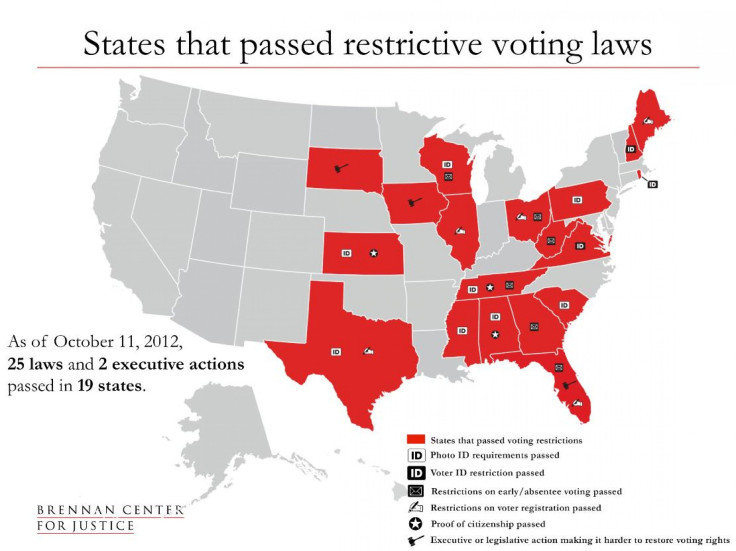Supreme Court Could Strike Down Key Part of Voting Rights Act, Because Apparently Racism Isn't A Problem In The South

Between 2011 and the end of 2012, 19 states passed a wave of laws intended to make it more difficult for certain individuals -- particularly minorities, according to some reports -- to vote. And yet, at least four members of the U.S. Supreme Court are reportedly skeptical as to whether a key section of the 1965 Voting Rights Act is still necessary to protect some voters from racial discrimination.
The United States has had a rather spotty history when it comes to ensuring that all of its citizens, no matter the color of their skin, can take advantage of their constitutionally protected right to vote in political elections. The Voting Rights Act was passed in response to the barriers -- such as poll taxes and literary tests -- many Southern states established as way to keep African Americans from the polls in post-Jim Crow America. Section 5 in particular, known as the pre-clearance provision, established extensive federal oversight over voting regulations in those states as a kind of safeguard so they would not revert to discriminatory policies.
“[The law] reflects what America can be when we keep our promises to citizens,” Debo Adegbile, who is defending the law before the Supreme Court on behalf of the NAACP Legal Defense Fund, said on Wednesday in a conference call with reporters.
But that very provision is currently being challenged before the U.S. Supreme Court. On Wednesday the justices heard oral arguments in Shelby County v. Holder, a case that explicitly challenges the constitutionality of Section 5 of the landmark civil rights law. The section specifies that states with a history of consistent racial discrimination must report new voting regulations to the U.S. Department of Justice for approval, a requirement that opponents say violates states’ rights.
Jurisdictions must report those changes if: They had, at the time of the law's passage, instituted some kind "test or device" restricting the opportunity to vote, and if less than 50 percent of voting age residents were not registered to vote (so basically, most of the South). The formula was expanded in 1975 to include to include jurisdictions that provided voting materials only in English when members of a language minority make up at least 5 percent of the population.
Shelby County, Ala., is arguing that the coverage formula included in Section 5 was written to apply to segregation-era policies that are no longer applicable. During oral arguments on Wednesday, Justice Anton Scalia reportedly reiterated that opinion, and he questioned whether the provision is a racial entitlement for minorities.
“Our response is, it’s not about any kind of ‘entitlement’. It’s about inviting everybody to the party that is democracy,” said John Greenbaum, the chief counsel for the Lawyers’ Committee for Civil Rights Under the Law.
He added that none of the justices disputed the fact that certain jurisdictions have, traditionally, been plagued by racism.
According to Pastor Harold Jones, Shelby County is one of those jurisdictions. Jones, who is a defendant in the case, has spent a lifetime in the area. And while he said conditions for African Americans have definitely improved since the passage of the 1965 law, racism has not been eradicated by any means.
“On many occasions in my younger days I was exposed to the KKK. I remember being afraid and my mother would put me under the bed to protect me,” Jones said. “I don’t want to see those days come back.”
As supporters often note, under the law’s “bailout” process, covered jurisdictions can be exempted from the DOJ preclearance if they can prove there have been no discriminatory voting practices for at least a decade, and if the state has taken action to improve minority voting rights. That could be one of the strongest arguments in favor of the law, since it demonstrates that federal oversight is not never-ending.
The Voting Rights Act has been extended four times since its initial passage. The latest extension occurred in 2006, when both the U.S. House and Senate overwhelmingly agreed to enact it for another 25 years.
But there have been constitutional challenges to the provision every time it’s been up for congressional approval. A 2009 challenge from Texas was ultimately struck down by the Supreme Court in an 8-to-1 vote, but it did not directly determine the constitutionality of Section 5.
If anything, the run-up to the 2012 election proved that voting laws are still a huge topic for debate in the U.S. But the large number of regulations passed during that time -- such as government-issued photo ID requirements (Alabama, Mississippi, South Carolina, Tennessee, Texas); early-voting cutbacks (Florida, Georgia, Tennessee); and the permanent disenfranchisement of ex-felons (Florida, Iowa, Kentucky and Virginia) -- may not be argued before the court, since Shelby County is specifically challenging the law’s 2006 extension.
The DOJ pushed back against those restrictions in Florida, South Carolina and Texas, the Brennan Center for Justice reports. But that would not have been possible without Section 5.
According to Laughlin McDonald, the director of the American Civil Liberties Union Voting Rights Project, the nation’s high court appeared to be split 4 to 4 in their opinion of the provision during oral arguments. Justice Anthony Kennedy, a moderate, may be the swing vote to make or break the case.
“I’m trying to convince myself there won’t be enough votes to strike it down,” McDonald said.
© Copyright IBTimes 2024. All rights reserved.





















